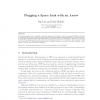Free Online Productivity Tools
i2Speak
i2Symbol
i2OCR
iTex2Img
iWeb2Print
iWeb2Shot
i2Type
iPdf2Split
iPdf2Merge
i2Bopomofo
i2Arabic
i2Style
i2Image
i2PDF
iLatex2Rtf
Sci2ools
ENTCS
2007
2007
Plugging a Space Leak with an Arrow
The implementation of conceptually continuous signals in functional reactive programming (FRP) is studied in detail. We show that recursive signals in standard implementations using streams and continuations lead to potentially serious time and space leaks under conventional call-by-need evaluation. However, by moving to the level of signal functions, and structuring the design around arrows, this class of time and space leaks can be avoided. We further show that the use of optimal reduction can also avoid the problem, at the expense of a much more complex evaluator.
| Added | 13 Dec 2010 |
| Updated | 13 Dec 2010 |
| Type | Journal |
| Year | 2007 |
| Where | ENTCS |
| Authors | Hai Liu, Paul Hudak |
Comments (0)

